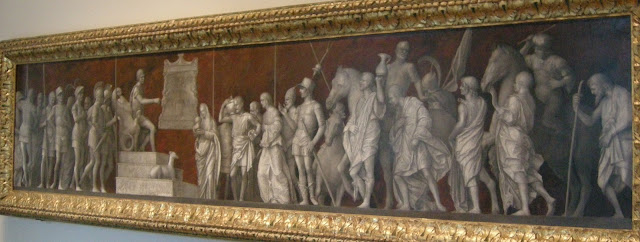The Continence of Scipio, sometimes called the Clemency of Scipio, is a wonderful story reflecting a distinctly Roman view of the virtues. The oldest surviving account is in Livy, and it eventually became a common theme in art, literature, and music during the Renaissance.
Publius Cornelius Scipio, later known as Scipio Africanus, commanded a Roman army in Spain during the Second Punic War (218-201 BC). The Roman soldiers captured a beautiful woman, who was engaged to the Celtiberian prince, Allucius, an ally of the Carthaginians.
She was presented to Scipio, perhaps because the soldiers knew of his reputation as a playboy. Instead of forcing himself upon her, making her a slave, or selling her for a hefty ransom, Scipio instead saw the opportunity to exercise his power with character.
If only more leaders could think and act in this way! I find great inspiration in the many paintings of this noble scene.
—3/2003
* * * * *
Soon afterwards an adult maiden who had been captured was brought to Scipio by the soldiers, a girl of such exceptional beauty that she attracted the eyes of all wherever she moved. On enquiring as to her country and parentage, Scipio learnt, amongst other things, that she had been betrothed to a young Celtiberian noble named Allucius.
He at once sent for her parents and also for her betrothed, who, he learnt, was pining to death through love of her. On the arrival of the latter Scipio addressed him in more studied terms than a father would use.
"A young man myself," he said, "I am addressing myself to a young man, so we may lay aside all reserve. When your betrothed had been taken by my soldiers and brought to me, I was informed that she was very dear to you, and her beauty made me believe it. Were I allowed the pleasures suitable to my age, especially those of chaste and lawful love, instead of being preoccupied with affairs of state, I should wish that I might be forgiven for loving too ardently.
"Now I have the power to indulge another's love, namely yours. Your betrothed has received the same respectful treatment since she has been in my power that she would have met with from her own parents. She has been reserved for you, in order that she might be given to you as a gift inviolate and worthy of us both.
"In return for that boon I stipulate for this one reward—that you will be a friend to Rome. If you believe me to be an upright and honorable man such as the nations here found my father and uncle to be, you may rest assured that there are many in Rome like us, and you may be perfectly certain that nowhere in the world can any people be named whom you would less wish to have as a foe to you and yours, or whom you would more desire as a friend."
The young man was overcome with bashfulness and joy. He grasped Scipio's hand, and besought all the gods to recompense him, for it was quite impossible for him to make any return adequate to his own feelings, or the kindness Scipio had shown him.
Then the girl's parents and relatives were called. They had brought a large amount of gold for her ransom, and when she was freely given back to them, they begged Scipio to accept it as a gift from them; his doing so, they declared, would evoke as much gratitude as the restoration of the maiden unhurt.
As they urged their request with great importunity, Scipio said that he would accept it, and ordered it to be laid at his feet. Calling Allucius, he said to him: "In addition to the dowry which you are to receive from your future father-in-law you will now receive this from me as a wedding present." He then told him to take up the gold and keep it.
Delighted with the present and the honorable treatment he had received, the young man resumed home, and filled the ears of his countrymen with justly-earned praises of Scipio. A young man had come among them, he declared, in all ways like the gods, winning his way everywhere by his generosity and goodness of heart as much as by the might of his arms. He began to enlist a body of his retainers, and in a few days returned to Scipio with a picked force of 1,400 mounted men.
—from Livy, The History of Rome, 26.50
Giovanni Bellini, The Continence of Scipio (c. 1508)



.jpg)
No comments:
Post a Comment